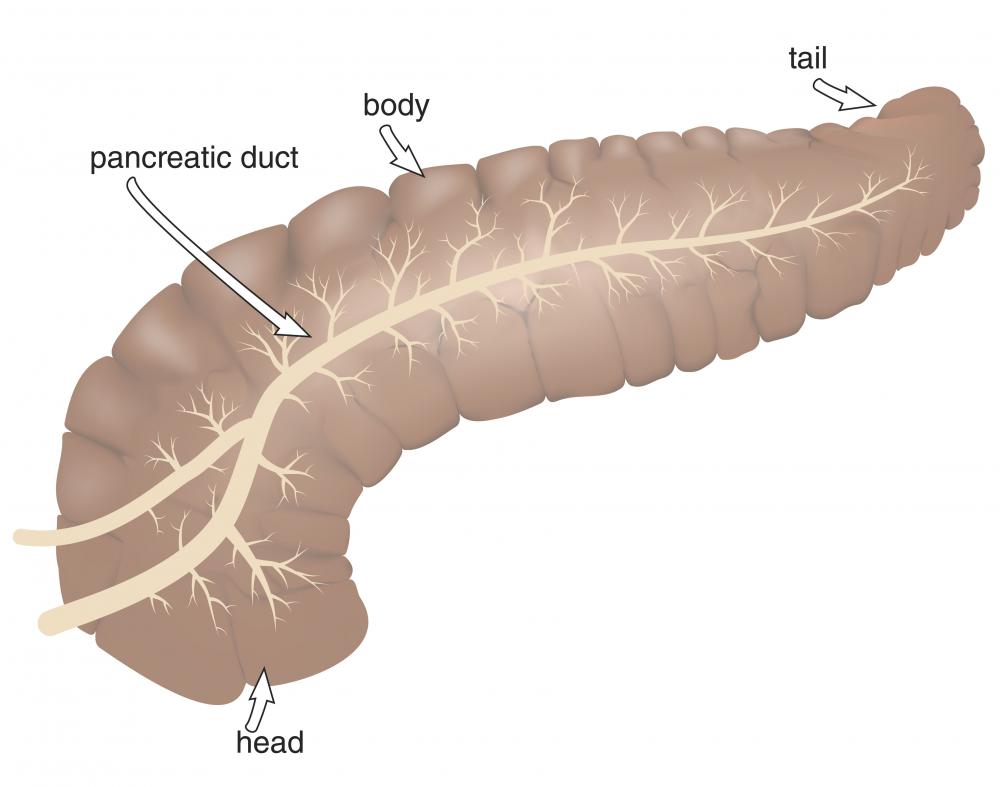At TheHealthBoard, we're committed to delivering accurate, trustworthy information. Our expert-authored content is rigorously fact-checked and sourced from credible authorities. Discover how we uphold the highest standards in providing you with reliable knowledge.
What are the Different Types of Protein-Digesting Enzymes?
Protein-digesting enzymes, also called proteases or peptidases, are proteins that metabolize other proteins into smaller molecules. Some proteases are a crucial component of the digestive systems of most animals, where they catalyze the breaking down of protein from foods into the amino acids from which these are made. Others serve as catalysts of many basic cell functions, including hormone activation and deactivation, cell death, growth and immune system activation. Different types of proteases are classified according to their mechanism of protein breakdown.
Protein digestion occurs through hydrolysis of the peptide bonds that join a protein's amino acids together. Proteases carry out this process, known as proteolysis. Protein metabolism involves dividing proteins into their constituent amino acids, which are then processed by different anabolic pathways into either new proteins or other compounds. The different types of proteases are often categorized according to which amino acid in a protein activates their cleaving of the peptide bonds that hold proteins together. The major types of protein-digesting enzymes are synthesized as large precursor molecules and then trimmed down to a smaller molecule, leaving only the working enzyme.

The major protein-digesting enzymes in the digestive system are pepsin, trypsin, and chymotrypsin. Pepsin is made in the stomach, and trypsin and chymotrypsin is made in the pancreas. These enzumes break down proteins in the stomach and small intestine while other digestive enzymes metabolize carbohydrates and lipids.
Pepsin is the most important of this group, and it is part of an enzyme group called aspartate proteases. The latter two — trypsin and chymotrypsin — are a type of enzyme called serine proteases. This group catalyzes some of the chemical cascades that lead immune cells to attack antigens and cause the reactions necessary for blood clotting.

Another of the types of protein-digesting enzymes are called exopeptidases and are manufactured in the pancreas. These remove amino acids from ends of a protein's polypeptide chain. This type of enzyme can completely digest a protein because it starts breaking the bonds between the individual amino acids at one end of the chain and continues doing this all the way down to the other end. Exopeptidases catalyze very rapid digestion of proteins and can be damaging to the surrounding tissue if they leak out of the pancreas and into the bloodstream because of injury.

Another group of protein-digesting enzymes controls the circulation of proteins by degrading excess or damaged molecules. Many of these enzymes are known as cysteine proteases, and they occur in many animals and plants. They are found in fruits such as pineapple and papaya and account for some of the intense acidity in the juices of these fruits. Cysteine proteases are essential to the process of programmed cell death, hormone manufacture, bone development and many signaling cascades in humans. Researchers also believe that this type of protease influences key points in the cell cycle, affecting the different stages of cell growth and division.
AS FEATURED ON:
AS FEATURED ON:


















Discussion Comments
In my high school, I remember learning about protein digesting enzymes? Honestly, it was a little complex at first, but it makes a lot more sense. Not only is this article a great read for those who want to learn about protein digesting enzymes and the like, but it further reinforces what I've learned years ago. This is very helpful to veterans and newcomers alike.
Going off of this article, it has me wondering, are there any diseases out there where people have trouble digesting the enzymes of certain proteins?
I'm asking because I'm aware that the reason why some people have food allergies is because they're stomach can't digest the enzymes of whatever it is they're eating. However, taking a supplement helps to create these enzymes, thus temporarily allowing them to digest it.
Just food for thought.
Post your comments